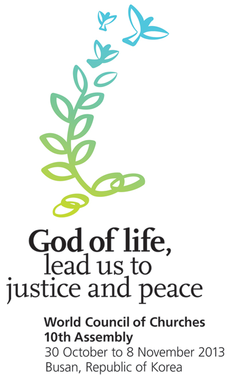Issues of justice in focus at WCC Busan assembly

From left, Shyreen Mvula, Malawian speaker with Rev. Dr Angelique Walker-Smith, moderator of the justice plenary at the WCC assembly in Busan.
06 November 2013
The plenary on justice at the World Council of Churches (WCC) 10th Assembly brings into focus the core of its theme “God of life, lead us to justice and peace.” Following on diverse reflections from around the world on Christian unity, Asia and mission, the assembly plenary on 6 November in Busan, Republic of Korea, highlighted struggles for justice.
The plenary, moderated by Rev. Dr Angelique Walker-Smith, through its speakers highlighted key issues of justice: justice in the global economic system, holding financial institutions accountable, continuing efforts for human rights and human dignity, empowering the churches to tackle the concerns of ecology, as well as addressing threats of HIV and AIDS.
Particular groups—women, children, persons with disabilities, HIV-positive people and young adults—were also brought directly into reflections on justice in the plenary.
Martin Khor from Malaysia, executive director of the South Centre, in his comments discussed the São Paulo Statement: International Financial Transformation for the Economy of Life, a document with strong policy recommendations for reforming the global financial system. He held rich countries in North America and Europe responsible for its financial institutions, which he identified as root causes of the current financial crisis, affecting economies of developing countries in many regions of the world.
Khor added that following Jesus’ example, along with prayer there is a need for concrete actions.
Another speaker, Dr Julia Duchrow from Germany, head of the Human Rights and Peace Desk of Brot für die Welt (Bread for the World), highlighted the WCC’s work in the field of human rights, spanning several decades, and particularly noted its programme on combatting racism.
Speaking about multinational corporations and governments, she said these institutions should provide for sustainable development, access to education and health.
Sources of justice, inspiring churches
Argentinian Bishop Iosif of Patara, from the Ecumenical Patriarchate and general vicar of the Archdiocese of Buenos Aires and South America, spoke of “love a source of justice.” Making reference to the environment and the sacredness of nature, he stressed the need for steps to renew relationships between the human beings and the creation.
Rev. Phumzile Mabizela from South Africa, executive director of the Interfaith Network of Religious Leaders living with or personally affected by HIV and AIDS (INERELA+), said that HIV-positive people have a “gift of dignity they can share with the churches.” She stressed that HIV is not merely a medical issue but an issue of social justice.
Speaking about gender injustice and the issue of rape, Mabizela challenged the churches to speak out. She called the women “back-bone of the churches” and said that churches have the responsibility to advocate for justice in venues such as the United Nations, amplifying the voices of the poor, who are the real agents of change.
After discussions from the speakers, personal stories of seeking justice were shared.
One of these stories was from Rev. Tafue Lusama, general secretary of the Congregational Christian Church of Tuvalu, who spoke on how climate change isaffecting his country and how communities are striving for climate justice.
Dr Lukas Andrianos from Madagascar, working for the Ecumenical Patriarchate and based in Greece, highlighted the challenges posed by the economic crisis in Greece. He detailed how the crisis has affected lives of people and urged ecumenical solidarity on the issue.
Shyreen Mvula, a 16-year old Malawian from the Church of Central Africa Presbyterian and an HIV-positive person, spoke about her own struggles for justice. She stressed that HIV is a not a curse from God but a disease and should be understood and treated in that way.
“No one can serve Christ and caste!” (WCC feature of 7 November 2013)
Recording of the Justice Plenary
Official website of the WCC 10th Assembly
High resolution photos available via photos.oikoumene.org




